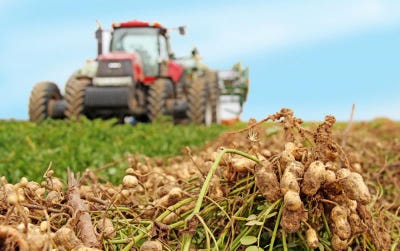
Peanut acres help to boost Mississippi's economy
Between 2005 and 2012, the monetary value of Mississippi's peanut production increased more than six-fold, according to Al Myles, Extension professor of agricultural economics at Mississippi State University." The economic footprint of peanuts in Mississippi’s overall agriculture picture has increased each year," he says.

The increase in Mississippi’s peanut acreage in recent years has not only provided another source of income and diversity for many of the state’s farmers, it also has been a boost to the economy, says Al Myles, Extension professor of agricultural economics at Mississippi State University.
“Just a few years ago, peanut production was a very small part of Mississippi’s agricultural picture, but today, peanuts are grown in about 40 of the state’s 82 counties,” he said at the Mississippi Farm Bureau Federation’s peanut commodity meeting at Hattiesburg.
“Much of the acreage expansion has been in the Delta counties and in the northeast part of the state,” he says. “From only 14,000 acres in the state in 2005, acreage totaled a record 47,000 acres planted in 2012 — the largest ever, ranking the state seventh in the nation in peanut acres.

THE VALUE of peanut production in Mississippi in 2012 topped $55 million, providing a boost to the state's ag economy.
“Mississippi led the nation in yield per acre in 2011, and was only narrowly behind Georgia in 2012. Production in 2012 totaled 187.2 million pounds, a 317 percent increase from 2005, and the crop was valued at $55.2 million.”
While oversupply and lower contract prices have resulted in a sharp cutback to an estimated 24,000 acres this year, “the future looks bright for the peanut industry in Mississippi,” Myles says.
“Between 2005 and 2012, the monetary value of the state’s peanut production increased more than six-fold. Since the National Agricultural Statistics Service first reported peanut production information in Mississippi, the demand for peanuts has grown significantly.”
The economic footprint of peanuts in Mississippi’s overall agriculture picture has increased each year, he says.
In 2005, returns to the peanut industry totaled $14.5 million; in 2012, that had climbed to $95.2 million. The economic impact of labor income in 2005 was $5.2 million; in 2012, it was $34 million.
The top 10 employment sectors impacted by peanut production in 2012, Myles says, were oilseed farming; support activities for agriculture and forestry; real estate establishments, food services and drinking places, monetary authorities and depository credit, intermediation activities, offices of physicians/dentists/other health practitioners, grain farming, civic/social/professional/similar organizations, maintenance/repair/construction of non-residential structures, wholesale trade businesses, and other sectors
Ag news delivered daily to your inbox: Subscribe to Delta Farm Press Daily.
Farm returns to the industry in 2012 totaled $60,302,35, non-farm $34,981,951. Farm labor income associated with the industry in 2012 was $25,495,974, non-farm $8,572,538. The economic impact on tax revenues was $1,644,989 state and local, and $4,289,092 federal.
Economic multipliers associated with peanut production in 2012, Myles says, show that for every $1 of returns to the peanut industry, another 73 cents was created in other areas of the local economy.
“A $1 increase in labor income generates about 49 cents in additional income in the local economy. Each additional job created in the peanut industry will result in .48 additional jobs in the area. And each $1 of returns to the farm will result in about 6 cents in federal and state taxes in the local economy.”
About the Author(s)
You May Also Like



